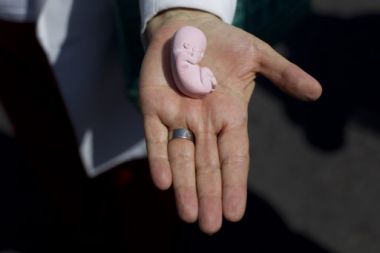Should children born alive after late abortions be regarded as victims of torture?

A European legal advocacy group is calling on the United Nations to regard children who are born alive after late term abortions as victims of torture.
The European Centre for Law and Justice approached the UN Special Rapporteur on Torture earlier this week to investigate what they have called "torture due to late abortion".
They refer specifically to Canada, where between 2000 and 2011 there were 622 cases of children born after an abortion that were simply left to die, and the UK, where in 2005 a total of 66 children suffered the same fate.
A 2007 study in the British Journal of Obstetrics and Gynaecology found that one in 30 abortions after 16 weeks result in a born-alive infant. In abortions after 23 weeks, that number jumps to almost one in 10.
The ECLJ argues that leaving a baby to die without medical care, food, or water, is comparable to the humanitarian situation in Syria where many people have been left without the same resources.
"Concerning Syria, the Special Rapporteur recently stressed that deprival of food, water, shelter and medical care constitutes a crime against humanity," the organisation said.
"Depriving newborn babies of elementary care, whatever the conditions of their birth, constitutes torture and should also be considered a crime against humanity."
The ECLJ also takes the view that because the periods where abortion is permitted are not aligned with when the child can feel pain, abortions can often be immensely painful for the child, and therefore should be considered as torture.
"Foetuses are responsive to touch at 8 weeks and have the physical structure to experience pain at 20 weeks.
"As early as 16 weeks, an infant can survive for a while out of the womb, and it is considered viable at 22 weeks."
In the UK abortion is legal up to 24 weeks, and up till the end of pregnancy in the case of foetal anomaly, and in Canada there is no legal term limit to abortion.
In 2012, there were 2,860 abortions performed in the UK at 20 weeks or more, with 160 of those performed after 24 weeks. In Canada, not including Québec, there were 549 abortions performed after 21 weeks.
The ECLJ argues that the medical techniques involved in many late term abortions cause the child in the womb a great deal of suffering and pain, and can therefore be appropriately compared to torture.
Specifically, they point to the practice known as "dilatation and evacuation".
"The cervix is dilated, then the 'content of the uterus' is pulled out with a clamp. In the end, the pieces are examined to make sure everything has been removed. This means that the body is gathered like a puzzle, because in many cases it has been dismembered during the operation.
"If there was no feticide injection first, or if the injection did not cause death, the foetus was alive while its members were being torn off one after the other. This frightfully cruel method is inhumane and constitutes torture."
A 2010 study from the journal Contraception found that in 13 per cent of women, the feticide injection does not take effect, meaning the foetus is alive for its dismemberment and evacuation from the womb.
In the UK, 67 NHS doctors were recently referred to the General Medical Council for illegally signing and filling out blank abortion forms.
Currently, UK law requires that before an abortion is performed, two doctors must sign a form declaring that they believe continuation of the pregnancy would cause physical or emotional harm to the woman.
Government guidelines require that at least one of the two doctors should have seen the woman in question, or at the very least should have spoken to her over the telephone, or read her medical notes.
An investigation by the Care Quality Commission found the 67 doctors had pre-signed forms without even knowing the names of the women they might be used for, much less their medical or emotional situations.
Despite the seriousness of this offence, a freedom of information request by the Daily Mail revealed that none of these doctors were referred to the police or even to a fitness to practice hearing.
Jim Dobbin, Labour MP for Heywood and Middleton, said in the Daily Mail: "This is clear evidence of the abortion-on-demand culture throughout the medical establishment.
"Sixty-seven doctors happily referred for abortions without knowing a single thing about the woman requesting them. Worse, at the very top, senior doctors and lawyers at the GMC decided to keep these crimes to themselves. This shames the GMC and makes a mockery of the Abortion Act."
David Burrowes the Conservative MP for Enfield Southgate and parliamentary chairman of the Conservative Christian Fellowship, expressed deep concern about the institutional culture surrounding access to abortion.
"It says something about how sinister and unaccountable abortion practice in the UK has become that such a large number of doctors could brazenly break the law and the most senior medical establishment in the land omit to refer their crimes to the police," he told the newspaper.
Labour peer Lord Campbell-Savours agreed, saying: "Whatever one's position on abortion, for or against, we can all agree on one simple principle: The law passed by Parliament should be enforced."











